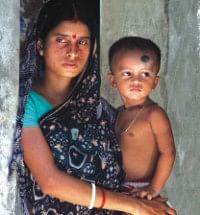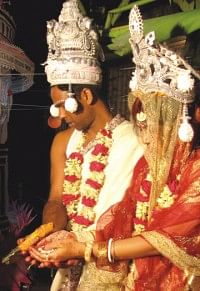| Home - Back Issues - The Team - Contact Us |
 |
| Volume 10 |Issue 18 | May 13, 2011 | |
|
|
Human Rights A Sexism Prone Culture While religions preach peace, equality and goodness, the practice of mostly all religions in Bangladesh quite contradicts to what they champion. While none of the vital issues addressed by all religions, such as removing economic and social discrimination or bringing justice in the society and etc have failed to be realised, implementation of all those religious laws which are discriminatory against women have been successfully practiced all along. Whereas voices have hardly been raised against any form of injustice, religious leaders have been very vocal when discriminatory laws against women faced the 'equal rights' challenges of the 21st century. Even though Amini, chief of Islami Ain Bastabayan Committee, has been the central character of the 'resistance' against the National Women Development Policy 2011, it's not just Islam which is prone to sexist implementation of its laws. Other major religions in the country- Hinduism, Buddhism and Christianity- all have, in some way or other, sexist practices. AANTAKI RAISA
Mrinmayee Saha (not her real name) was married off at the age of 22 with a much older man. Despite her extraordinary academic qualifications, her parents wanted her to get 'settled' as early as possible because in Bangladesh “it's really tough to find an eligible Hindu man to marry your daughter off with” according to Mrinmayee's parents. However, the very 'eligible Hindu man' those parents found for their daughter turned out to be a schizophrenic patient but unfortunately Mrinmayee was already married to him for three years then. Being an educated and an upper echelon family in the Hindu society, her parents got her 'separated' from the husband as she couldn't divorce him, as the concept of divorce doesn't exist in Hindu marriages. A Hindu marriage doesn't have any form of registration, as Hindu men and women get married having the 'holy fire' as the witness. “It's sad that Hindu Marriage Law hasn't been reformed since the Hindu Marriage Disabilities Removal Act, 1946," which only permitted separation and alimony,” says Nina Goswami, Senior Deputy Director, Mediation of Ain o Salish Kendra. “This allowed women to live separately from their husbands but didn't get them any freedom to remarry,” adds Goswami who is also a Rapid Response Unit advocate at the Supreme Court of Bangladesh. “This is not a problem for Hindu men because they can marry even hundreds of women if they want to, regardless of separation; though out of social bonding Hindu men are not usually polygamous, there is nothing illegal if they choose to be according to Hindu laws. The 1946 Act cannot be applied at the present time; it needs to be changed and improved with respect to the changing lifestyle and mentality of Hindu women and men today,” she says. According to her, there can be many reasons such as impotency or individual differences, for which a woman might want to divorce her husband; but lack of such options makes it impossible for a woman to move forward in life. Whereas laws and religions both are supposed to benefit people, their implementations are doing the opposite. “The religious laws that we abide by are age old; they don't apply to this century. All religions change- Hinduism or Islam. Even Islam says when solutions cannot be found in Quran, to look into the Hadith or in the verses of the Sahabis. Hindu scriptures have also evolved with time. If the religion itself accepts change, why can't its laws be amended? The Hindu marriage law that is followed today is inhuman and needs to be changed,” she adds. Ain o Salish Kendra (ASK), a human rights and legal aid organisation along with Bangladesh Mahila Parishad and Manusher Jonno have proposed an amended Hindu Matrimony Law which responds to the demand of time and is much less discriminatory against women. The draft of the proposed law has been submitted to the responsible parliamentary committee in 2011. But according to Goswami, Hindu men seem to dislike the idea as they think there are more severe problems for the Hindus in Bangladesh than the matrimony law and the problems like the Vesting Law should be solved first. “While drafting the amendments of the matrimony law, all the resistance came from men. Men prefer to have superiority and advantage over women and deprive women,” complains Goswami. India, having the majority of Hindu citizens, has implemented a uniform matrimonial registration law, so that women of all religions are protected when they get into a matrimonial relationship, regardless of the religion they follow and it has been active since 1955. “It's time for us to have a civil law so that women of all religions are protected socially and financially,” suggests Goswami. None of the religions other than Islam, have matrimonial registration system in Bangladesh. All the marriages are conducted according to the religious ritual, without any paper documentation and proof. As a result, women of these religions do not get any kind of security. “When I got married, I had to believe that my husband is my god and I must have faith in him, that he will protect me and provide me with shelter,” says Shuchorita Devi (not her real name) who has been married for 36 years now. “There is no legal proof of my marriage; I have to live on the truthfulness and kindness of my husband and my relatives. Life is kind of hard this way,” she adds.
Marriage laws are not the only way that discriminates women. There is the recently hyped 'inheritance law' that are biased against the daughters, sisters and wives of the country. The National Women Development Policy 2011 does not say anything about the equal distribution of the inherited property; it speaks of assurance to provide women what they have inherited rightfully. “'Fortunately' for Hindus, there is no inherited property for women, so Hindu men kept quiet during the 'Amini resistance',” says Goswami. “They don't need to worry about a thing; Hindu women aren't going to get any properties anyway,” remarks Goswami sarcastically. There is no domestic law that can provide women with any kind of financial security. As Hindu women do not inherit anything from their father, neither they have share on their husband's properties, they are compelled to live a very insecure life. “If a woman gets beaten up by her husband, she cannot move to her father's house because she doesn't have any legal right there, neither can she protest her husband's behaviour because her husband doesn't owe her anything. All she can do is to endure the torture silently,” says Goswami as she explains the brutality and dangers of the absence of a domestic inheritance law. The government, which is supposed to protect its citizens,is yet to implement and even propose a domestic law that would prohibit such 'violence' against women. In our neighbouring democratic country, India, inheritance law is different for the followers of different religions but the Hindu inheritance law has been amended there and women enjoy their rights on their husbands' and fathers' properties. This gives women a great sense of security which women of our country are missing. Though Christianity provides equal inheritance for all children, Buddhism is governed by Hindu laws in Bangladesh. Implementation of an unbiased inheritance law will save our women from a lot of suffering. Kavita Ranee Biswas, now a human rights activist, was married off at the age of 13. She was physically tortured by her husband but couldn't leave him because of the society and because she didn't have anywhere else to go. But Kavita stood up for her rights and the rights of other women who are the victims of religious bias against women. Not all women are as strong as Kavita has been. It's high time that the government takes actions to not just propose but implement domestic laws which will protect and provide security to the women of this country regardless of their religion, cast and creed.
Copyright
(R) thedailystar.net 2011 |
||||

